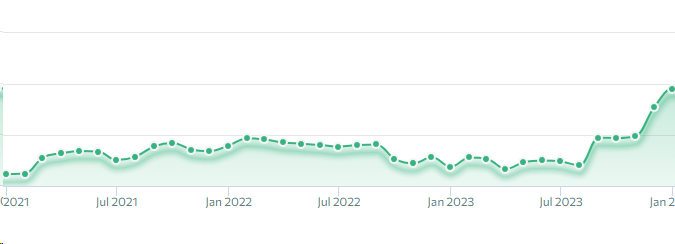Keeping up with the latest trends isn't just an advantage; it's essential for survival in the ever-evolving landscape of e-commerce. As the digital realm continues to shift and adapt, so too do the algorithms that govern search engine results.
For e-commerce businesses, this means constantly reassessing and realigning their SEO strategies to ensure visibility in an increasingly competitive market.
In this blog post, we'll delve into the intricacies of e-commerce SEO and its vital connection to the latest search engine algorithms. Whether you're a seasoned online retailer or just dipping your toes into the world of e-commerce, understanding and adapting to these algorithmic shifts is paramount for success.
With a trusted SEO agency by your side, you’ll understand the dynamic landscape of e-commerce SEO as we share key insights, actionable strategies, and expert advice to ensure your online store not only survives but thrives in the digital sphere.
Let’s get right into it!

Introduction to e-Commerce SEO
Visibility is everything in the bustling world of e-commerce. With millions of online stores vying for attention, mastering the art of search engine optimisation (SEO) is non-negotiable for e-commerce businesses.
But what exactly is e-commerce SEO?
E-commerce SEO is the process of optimising your online store's website and product pages to rank higher in search engine results pages (SERPs) for relevant keywords and phrases. Unlike traditional SEO, e-commerce SEO requires a unique approach tailored specifically to the complexities of online retail.
At its core, e-commerce SEO aims to enhance your website's visibility, drive targeted traffic, and ultimately increase sales and revenue. By optimising your online store for search engines, you can attract qualified leads, improve user experience, and outshine competitors in a crowded digital marketplace.
Why it’s crucial for online success
In today's competitive e-commerce landscape, a strong SEO strategy is more important than ever. With consumers increasingly turning to search engines to discover products and make purchasing decisions, businesses that neglect e-commerce SEO risk being lost in the vast online sea.
By investing in e-commerce SEO, businesses can establish a strong online presence, capture the attention of their target audience, and drive sustainable growth in the digital age.
The dynamic nature of search engine algorithms
Search engine algorithms play a pivotal role in determining which websites rank highest in search engine results pages (SERPs). Understanding the intricacies of search engine algorithms is significant for e-commerce businesses looking to stay ahead of the curve and maintain a competitive edge.

What is a search engine algorithm?
A search engine algorithm is a complex set of rules and criteria used by search engines to determine the relevance, authority, and quality of web pages in response to a user's search query. These algorithms analyse various factors, such as keyword relevance, content quality, backlink profile, and user experience, to deliver the most relevant and valuable results to users.
How does a search engine algorithm work?
Search engine algorithms work by crawling, indexing, and ranking web pages based on their relevance and authority in relation to a user's search query. When a user enters a search query, the search engine's algorithm sifts through billions of web pages in its index to identify the most relevant matches.
These matches are then ranked based on a combination of factors, including keyword relevance, content quality, backlink profile, and user engagement metrics.
Types of search engine algorithm updates
Search engine algorithms are constantly evolving to improve the quality and relevance of search results for users. Major search engines like Google regularly roll out algorithm updates, which can have a significant impact on website rankings and visibility.
Some common types of search engine algorithm updates include:
- Core Updates: These updates involve significant changes to the search engine's core ranking algorithm, often resulting in noticeable fluctuations in website rankings and traffic.
- Panda Updates:Panda updates focus on assessing the quality and relevance of website content, penalising sites with thin, low-quality content while rewarding those with high-quality, valuable content.
- Penguin Updates:Penguin updates target spammy or manipulative link-building practices, penalising websites with unnatural or low-quality backlink profiles while rewarding those with natural, high-quality backlinks.
- Hummingbird Updates:Hummingbird updates aim to improve the search engine's understanding of user intent and context, enabling it to deliver more relevant and accurate search results, particularly for long-tail and conversational queries.
Adapting SEO strategies for large e-commerce sites
As e-commerce continues to flourish, the competition for online visibility and customer engagement intensifies. For large e-commerce sites, implementing effective SEO strategies is paramount to stand out amidst the digital noise and attract organic traffic.
This section explores key considerations for adapting SEO strategies tailored to the unique needs and challenges of large e-commerce websites.
Content quality and relevance
Content reigns supreme in the realm of SEO. In 2023, experts considered high-quality content as one of the most important search ranking factors.
For large e-commerce sites, prioritising content quality and relevance are essential to resonate with both search engines and users. High-quality, informative, and engaging product descriptions, category pages, and blog posts not only enhance user experience but also signal expertise and authority to search engines.
By conducting comprehensive keyword research, optimising on-page content, and regularly updating and refreshing content, large e-commerce sites can maintain relevance and visibility in SERPs.
Technical SEO considerations

Technical SEO forms the foundation of a robust e-commerce SEO strategy. Large e-commerce sites must address the following technical aspects to ensure optimal visibility and performance in search results:
Implementing best practices for site structure, URL optimisation, internal linking, and XML sitemaps can improve indexation and crawlability while optimising for mobile devices enhances user experience and supports mobile-first indexing.
E-A-T (Expertise, Authoritativeness, Trustworthiness)
E-A-T is a critical concept in Google's search quality guidelines, particularly for YMYL (Your Money or Your Life) websites like e-commerce platforms. Large e-commerce sites must demonstrate expertise, authoritativeness, and trustworthiness in their content and overall online presence to build credibility and trust with both users and search engines.
This involves showcasing credentials, certifications, customer reviews, and testimonials, as well as ensuring transparency, accuracy, and integrity across all aspects of the site.
Monitoring algorithm changes
Staying abreast of algorithm changes and updates is paramount for large e-commerce sites. Search engine algorithms evolve constantly, impacting website rankings and visibility.
By actively monitoring algorithm changes, analysing their impact on site performance, and adapting SEO strategies accordingly, large e-commerce sites can navigate algorithmic fluctuations effectively and maintain a competitive edge in SERPs.
Tools and resources for SEO adaptation
Leveraging the right tools and resources is essential for adapting strategies to the dynamic search landscape.
Here, we’ll explore a range of tools and resources that can empower you to enhance your SEO efforts and stay ahead of the competition.
SEO tools for your business

- Keyword research tools: Keyword research tools like SEMrush, Ahrefs, and Google Keyword Planner enable e-commerce sites to identify relevant keywords, assess search volume and competition, and uncover new keyword opportunities. These tools provide valuable insights for optimising website content, product descriptions, and metadata to improve search visibility and attract targeted traffic.
- Technical SEO tools: Technical SEO tools such as Screaming Frog, SEMrush, and Moz Pro enable comprehensive analysis of website health, crawlability, and indexing issues. These tools provide valuable insights into site structure, performance, and potential technical SEO improvements.
- Competitor analysis tools: Tools like Ahrefs, SpyFu, and SimilarWeb offer invaluable competitive intelligence by allowing users to analyse competitor websites, keywords, backlink profiles, and search rankings. This data helps identify opportunities, benchmark performance, and refine SEO strategies.
- Off-page SEO tools: Off-page SEO tools such as Majestic and BuzzSumo aid in identifying and analysing backlinks, social media engagement, and content amplification opportunities. These tools facilitate effective link building, brand mentions monitoring and influencer outreach.
- Local SEO Tools: For e-commerce businesses with physical locations, local SEO tools like Google My Business, BrightLocal, and Yext optimise local search visibility, citation management, and customer reviews. These tools ensure accurate business information across online directories and enhance local search rankings.
- Analytics tools: Analytics tools such as Google Analytics and Google Search Console provide actionable insights into website traffic, user behaviour, keyword performance, and search impressions. By monitoring key metrics and performance indicators, e-commerce sites can measure the effectiveness of their SEO efforts and identify areas for improvement.
Resources for SEO knowledge and updates
- SEO platforms: Comprehensive SEO platforms like HubSpot, Yoast, and SE Ranking offer a suite of tools and resources for keyword research, on-page optimisation, content management, and performance tracking. These platforms streamline SEO workflows and empower e-commerce sites to execute effective SEO strategies.
- SEO specialists and marketers: Following experienced SEO specialists and marketers can help businesses gain more knowledge on the SEO landscape. They usually provide invaluable expertise, strategic guidance, and execution support for large e-commerce sites.
- LinkedIn: LinkedIn serves as a valuable resource for networking, learning, and staying updated on the latest SEO trends and industry insights. Joining SEO-related groups, following industry experts, and engaging in discussions can provide valuable knowledge and opportunities for collaboration.
- YouTube: YouTube is a rich source of educational content, tutorials, and case studies on SEO best practices, strategies, and tools. Subscribing to SEO channels, watching informative videos, and participating in webinars can expand knowledge and skills in e-commerce SEO adaptation.
- Inspire Blog: Inspire Digital is a bespoke SEO agency based in Scotland. Its blog offers a wealth of articles, guides, and resources on SEO, web development, digital marketing, and e-commerce strategies. Regularly visiting the blog and exploring relevant topics can provide actionable insights, industry updates, and success stories to inspire and inform SEO adaptation efforts.
Case study: How adapting to search engine algorithms brings success to Lorna Davis Florist
Lorna Davis Florist is a beloved local flower boutique based in Perth. They are well-known for their best quality fresh flowers with a personal, professional, and friendly service.
Specialising in both traditional and contemporary designs for corporate events, weddings, funerals, and special occasions, Lorna Davis Florist brings dreams to life through the language of flowers, transforming moments into memories that last a lifetime.
Driving growth with Shopify and SEO
As a thriving e-commerce business, Lorna Davis Florist operates on the Shopify platform, leveraging its robust features and user-friendly interface to showcase its stunning floral creations and attract customers from near and far.
Recognising the importance of search engine optimisation (SEO) in driving organic traffic and increasing online visibility, Lorna Davis Florist partnered with Inspire Digital to enhance its SEO strategy and align it with the latest search engine algorithms.
By leveraging SEO techniques tailored to the unique needs of e-commerce businesses, we helped Lorna Davis Florist optimise its Shopify website for maximum search engine performance.
Through strategic keyword targeting, content optimisation, and technical SEO enhancements, we ensured that Lorna Davis Florist's website ranked prominently in search engine results pages (SERPs) for relevant queries, driving targeted traffic to their online store.
The results: A blossoming transformation

Thanks to our collaborative efforts and a strategic focus on SEO, Lorna Davis Florist experienced remarkable growth in online visibility and website traffic. The business saw a significant increase in organic search traffic, with website visits soaring by 200%.
This surge in traffic not only boosted brand awareness and customer engagement but also translated into tangible business results, driving more inquiries, orders, and revenue for Lorna Davis Florist.
By adapting to the ever-changing landscape of search engine algorithms and embracing best practices in e-commerce SEO, Lorna Davis Florist has blossomed into a digital success story, thriving in the competitive online marketplace and continuing to delight customers with its breathtaking floral arrangements and impeccable service.
Empower your e-commerce success with effective SEO adaptation

Staying ahead of the curve requires continuous adaptation and optimisation of SEO strategies. By embracing the dynamic nature of search engine algorithms, implementing effective SEO strategies, and leveraging the right tools and resources, large e-commerce sites can enhance their online visibility, attract targeted traffic, and drive higher conversions.
As your trusted partner in digital success, Inspire Digital is here to support your SEO journey every step of the way. Our team of experienced professionals specialises in crafting tailored SEO solutions that align with the latest search engine algorithms and industry best practices.
Whether you need strategic guidance, technical expertise, or ongoing optimisation support, we're here to help you achieve your e-commerce goals and maximise your online potential.
Ready to elevate your e-commerce SEO strategy? Contact Inspire today for a personalized SEO consultation and take your online presence to new heights. Let's unlock the full potential of your e-commerce website together.


























